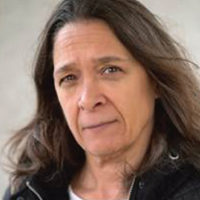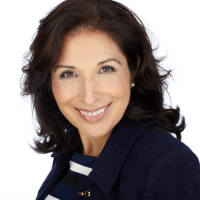
Dr. AnnMaria Rousey De Mars will present ‘In the End, You Rescue Yourself’. She is the President and founder of 7 Generation Games, developed as a tool for bringing underperforming students up to grade level in mathematics. She has more than 30 years experience in education, from eighth-grade math teacher to doctorate-level statistics professor and every level in between.
Named one of Forbes’ 40 Women to Watch Over 40: Women who are reinventing, disrupting and making an impact, AnnMaria is doing just that at the helm of 7 Generation Games. Learn more about AnnMaria

Hattie Kauffman will present ‘Do a Little Bit More’ followed by a book signing. She started her broadcast career on college radio at the University of Minnesota. Next, she began to report and anchor for KING 5 News in Seattle, earning four Emmy awards. ABC’s Good Morning America whisked Hattie to New York in 1987, where she served as a Special Correspondent and frequent substitute anchor.
In 1990, Hattie moved to CBS News as a correspondent and substitute anchor on CBS This Morning. In her two decades with the network, Hattie also reported for 48 Hours, Street Stories, Sunday Morning, CBS Radio, CBS Special Reports, the Early Show, and CBS Evening News. Hattie’s memoir, Falling Into Place, was released in September 2013. Learn more about Hattie
Special Features
- Kent Nerburn will present ‘Neither Wolf Nor Dog—From Book to Film—The Journey of a Teaching Story’ featuring a screening of the new film Neither Wolf Nor Dog based his book by the same title. The film features Dave Bald Eagle and was partly filmed in the Western Dakotas. Kent will also lead a discussion of his book and have a book signing. Learn more: kentnerburn.com.
- Dr. Scott Simpson & Sharla Steever ‘Creating a Culturally Responsive Classroom with OSEU’ Panel
- ‘Youth Day’ includes Higher Education Panel, Student Panel, Keynote Luncheon, Traditional Games
Breakout Sessions
More to be announced
- Indigenous Peoples and Challenges of Decolonizing Language and Culture – Dr. Mejai B.M. Avoseh
Colonialism undermined most indigenous people’s language, culture, values, and entire essence—21st century education should “decolonize” this in spite of the challenges. - Trauma-Informed Schools and Communities – Dr. Terri Bissonette
Research describes lasting effects of adverse childhood experiences, and promising systemic approaches and strategies to mitigate the effects of trauma. - Proven Strategies for Classroom Management – Johanna M. Bond
Techniques to reduce behavioral problems, increase student performance, create an enjoyable classroom climate; students learn to take responsibility. - Conversations with Experience—For New and Aspiring Teachers -Amy Boutchee, Sherry Johnson, Panel
Current educators will informally discuss topics and scenarios with those new to, or pursuing, the education field. - Waterworks—A New Sanford Underground Research Facility Curriculum Unit – Dr. Becky Bundy
Environmental science unit focuses on why water is important for life and studying watershed contaminants and bioremediation. - Awesome Accessibility – Steven Buras, Lynda Lowin
Accessible reading materials for individuals unable to read standard print, for all ages. - Walk Forward with Bravery: Life Skills for the Young Native American – Cynthia Catches
Prevention curriculum for grades 2-8, based on a whole-body theory and Native American culture. - Digital Coaching: Helping American Indian Students Navigate College Admissions Through Social Media and Texting – Orville Cayaditto
Native Pathways to College strategies adapted to latest trends in different communication platforms. - Helping Youth Become Producers (Not Just Consumers) of Technology – Dr. AnnMaria Rousey De Mars
Schools can work with technical companies to actively involve youth in many ways. - What Can Work-Based Learning Do For Your Students? – Andrea Diehm
Work-based learning is part of workforce development for students: its definition, types, benefits. - The SD GEAR UP Journey – Peggy Diekhoff, Murray Lee
Updates since BHSU became lead partner, including Middle School Camps, Summer Honors, activities during the school year. - Wokini Initiative – April Eastman
Programs and support for tribal students at SDSU, collaborating with tribes and tribal colleges. - Building Our Future Workforce – Tammy Granados, Jerrica Widow
Cheyenne River Youth Project’s internships build employable skills while nurturing healthy holistic life skills. - South Dakota College Application Week: Creating a College-Going Culture – Molly Hall-Martin, Leon
Leader Charge Program helps high school students navigate the complex college admissions process. - I Used to Just Know “Teepee” and “How” – Peter Hill
Lakota immersion preschool and elementary programs at Thunder Valley; cross-cultural bridge-building. - Bringing Back Traditional Games – Hope Kleine, Prairey Walkling
Traditional Games trainings available; statewide Native Games Coalition; how to bring the games to your community. - Networks of Support—Peer Leadership Approach – Tim McGowan
Approach focuses on developing leadership skills by increasing student capacity for humanity; program implemented in several schools. - Peer Leadership and Collaboration – Tim McGowan with panelists from McLaughlin School, Pine Ridge School, Rapid City Central School
Meet Peer Leaders from three schools on leadership and mentoring focusing on connectedness, and their inter-school collaborations. - Set Yourself and Your Students Up for Success with Resources from the SD State Library – Nina Mentzel, Brenda Hemmelman
Access to FREE databases and materials through resources provided by SD State Library. - Woope Sakowin: Classroom Management Using the Seven Sacred Virtues (Laws) – Tamera Miyasato
Provide structure, promote positive behavior, develop trust between students and teachers; steps to adapt to classroom needs and transform classrooms into safe and constructive learning environments. - Theory of Planned Behavior and Academic Success – Dr. Erica Moore
Planned behavior used to predict academic success for marginalized groups; study focused on LBCC students from three tribes on their attitudes, beliefs, perceived behavioral controls. - A Prevention Program Partnering with Schools to Form Healthy Students – Shana Pourier
Prevention curriculum for grades 2-8, a model based on Lakota values, and teaches using culture to deal effectively with risky behaviors. - Customized Learning: From Tinkering to Transformation – Amelia Rose
Customized learning meets students at their level, in their most effective style, and with content of interest that is culturally responsive. Students are challenged, and eager to learn. - NASA and the Navajo Nation: a 12-year Collaboration Bringing Together Cultural and Scientific Knowledge for Navajo Youth and Communities – Daniella Scalice, Angela Barney-Nez
Native youth can pursue STEM education without compromising cultural identity. Two educator guides bring science and culture together into hands-on activities for youth. - Gardening for Health Across South Dakota – Jason Schoch, Patricia Hammond
SDSU Extension works with Native communities on various gardening projects to provide food access and nutrition/physical activity education to communities and schools. - Creating Success From Within for All Students: Staff Actions That Matter! – Gabrielle Seeley, 4 Students
Strong results with 100% at-risk students. Students will show how you and your staff can dramatically increase success! - Doing What Kids Need in the Dupree Classroom – Susan Stewart, Dr. Pandi Pittman
Self-paced modules, which include websites to help student writing skills, customized learning; meets the needs of diversity of students. - College Readiness for Under-Resourced Students – Deb Thorstenson, Leon Leader Charge
Prepare secondary students to consider post-secondary education. Also learn about Jump Start, assisting students with college persistence. - The Efficacy of an American Indian Culturally-based Risk Prevention Program for Upper Elementary School Youth Residing on the Northern Plains Reservations – Dr. John Usera
Culturally based prevention program focusing on risk behaviors, adult and parent communication, Lakota Identity and self-esteem.